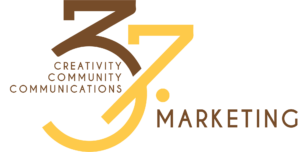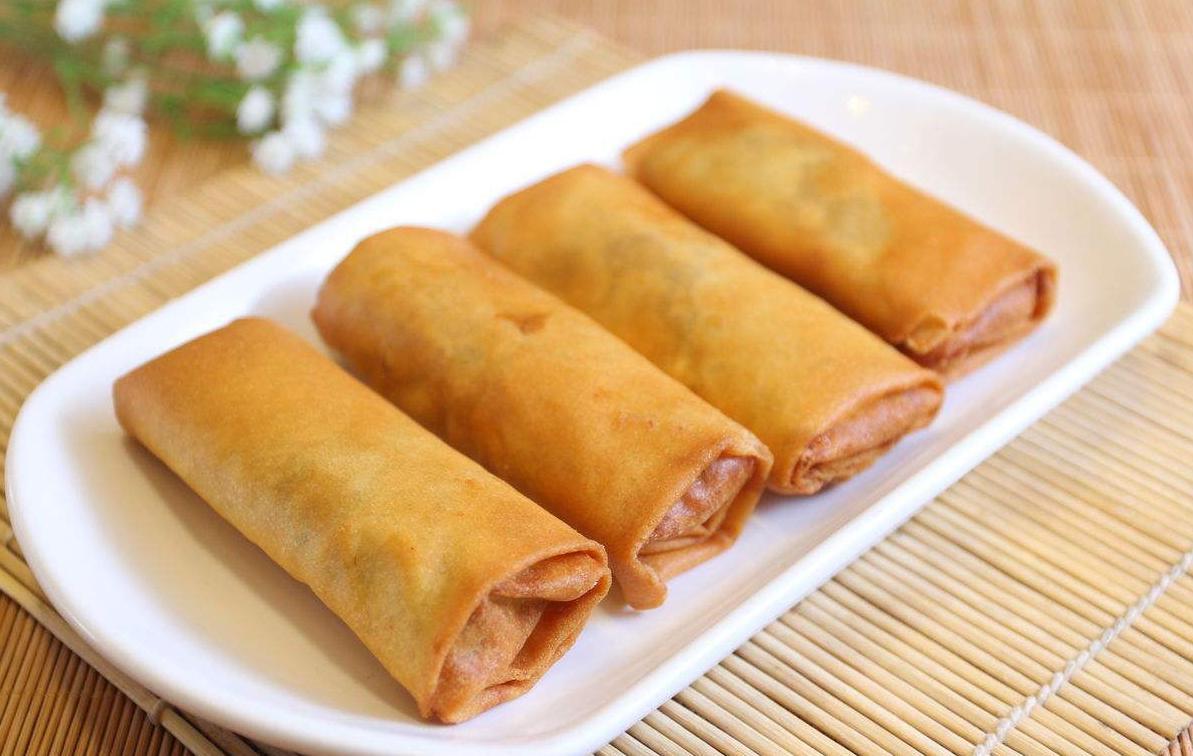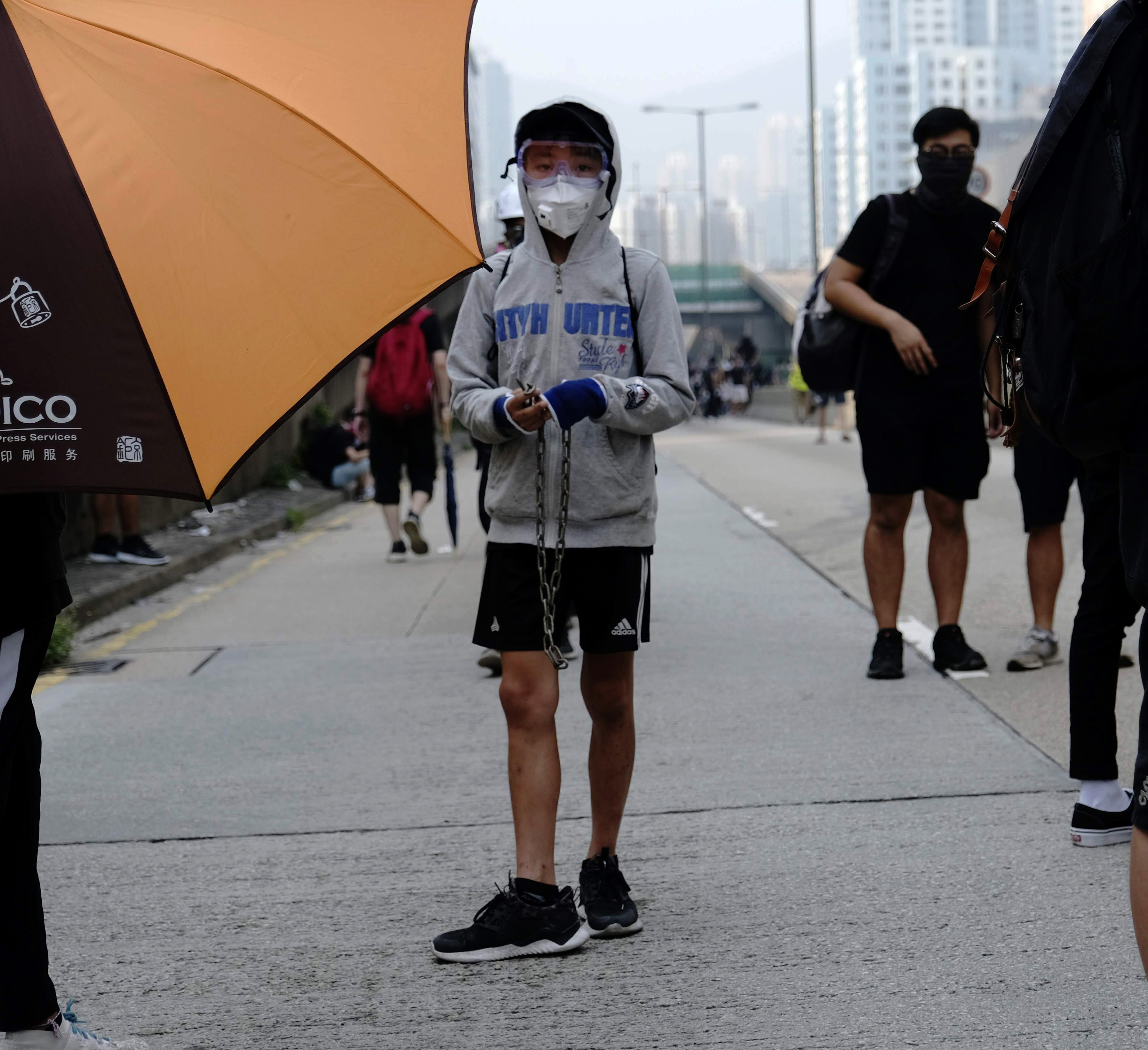
A young person is seen during a violent activity in Hong Kong, south China, Aug. 24, 2019. (Xinhua)
– Some schools are used by ill-intentioned opposition politicians as a propaganda platform to disseminate biased information, stir up hatred and advocate radical ideas.
– “Young people are being incited to disobey rules at school, home and also on the street.”
HONG KONG, May 16 (Xinhua) — Hong Kong’s education system is in the spotlight once again over a question on the history exam for Hong Kong’s university admissions concerning Japan’s invasion of China during the first half of the 20th century, causing a public outcry.
The Hong Kong Diploma of Secondary Education exam had a question about whether Japan did more good than harm in China between 1900 and 1945, asking examinees to express and support their opinion taking reference to the two listed excerpts and their knowledge.
One of the excerpts was a 1905 article by a Japanese educator describing the arrangement to teach Chinese students law and politics. The other excerpt cited parts of a 1912 letter from a then Chinese revolutionary leader to a Japanese politician seeking financial help, as well as a one-year loan contract in 1912 by a Japanese company to China.
“The question is extremely inappropriate,” said Chan Wai-keung, a faculty member of the Hong Kong Polytechnic University. “It is similar to asking students in Western countries whether Adolf Hitler did more good than harm in Europe.”
Chan said the materials mentioned nothing about the catastrophic consequences of Japan’s invasion of China, seriously misguiding students and violating academic standards.
Ting Kong-ho, a history teacher at the Pui Kiu Middle School and a committee member of the Hong Kong Federation of Education Workers, said the biased materials made it difficult for the examinees to answer the question from the “no” perspective.
The Japanese invasion of China from 1931 to 1945 was one of China’s darkest periods in history, with more than 35 million Chinese soldiers and civilians killed or injured.
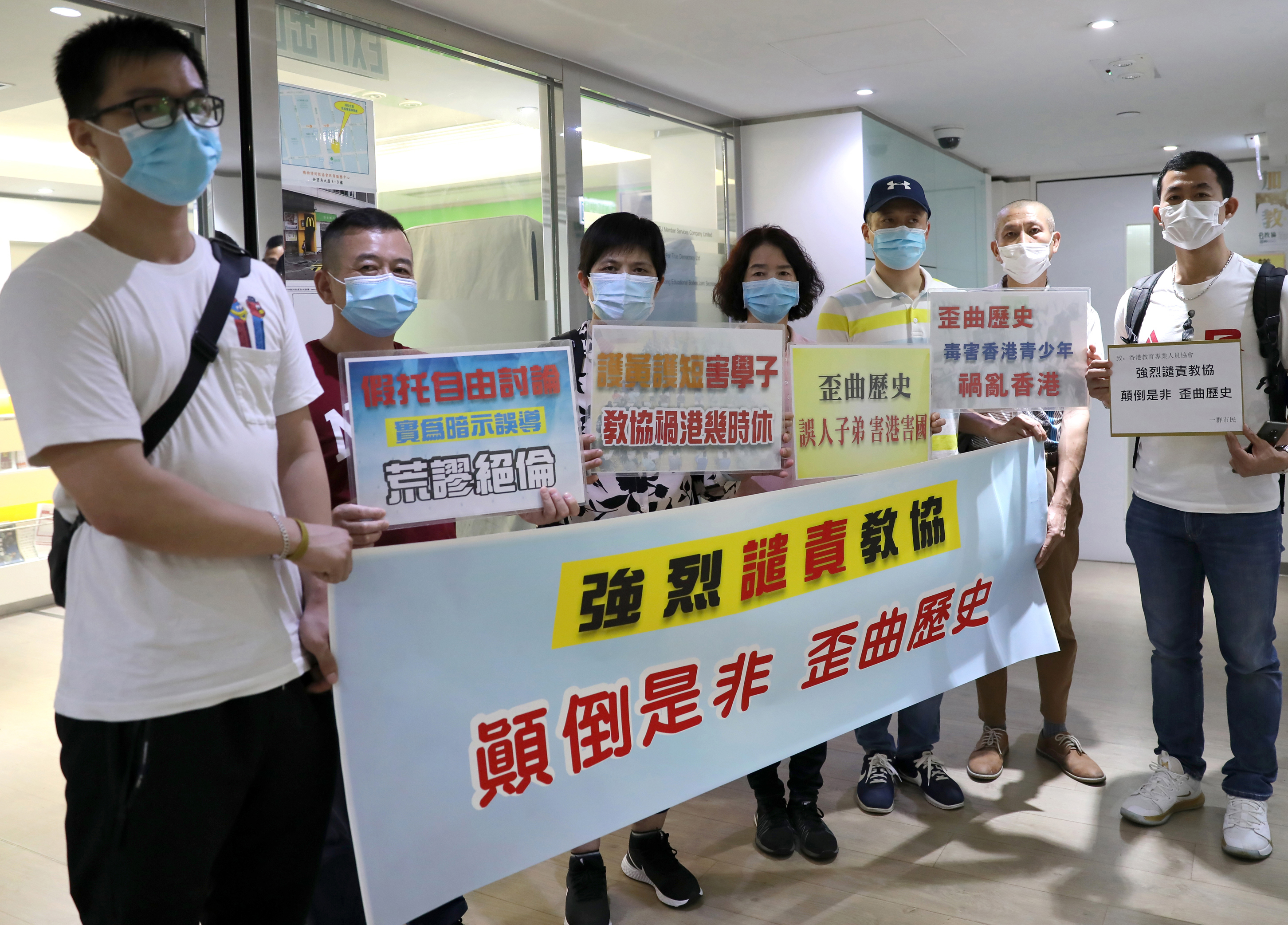
People hold placards denouncing “falsifying historical facts”, while protesting at the Hong Kong Professional Teachers’ Union in Hong Kong, south China, May 15, 2020. (Xinhua)
CONCERN AND CREDIBILITY
Following public criticism, the Hong Kong Special Administrative Region (HKSAR) government expressed grave concerns. The HKSAR government’s Secretary of Education Kevin Yeung said on Friday that the test question might guide students to reach a biased conclusion and deviate from comprehensive and objective historical facts.
It does not fit the purpose of the curriculum and evaluation guidelines, and also seriously hurts the feelings and dignity of the Chinese people who suffered greatly during the Japanese invasion of China, he said.
“We will request that the Hong Kong Examinations and Assessment Authority invalidate the question and make appropriate adjustments to ensure the examination’s credibility and effectiveness,” he said.
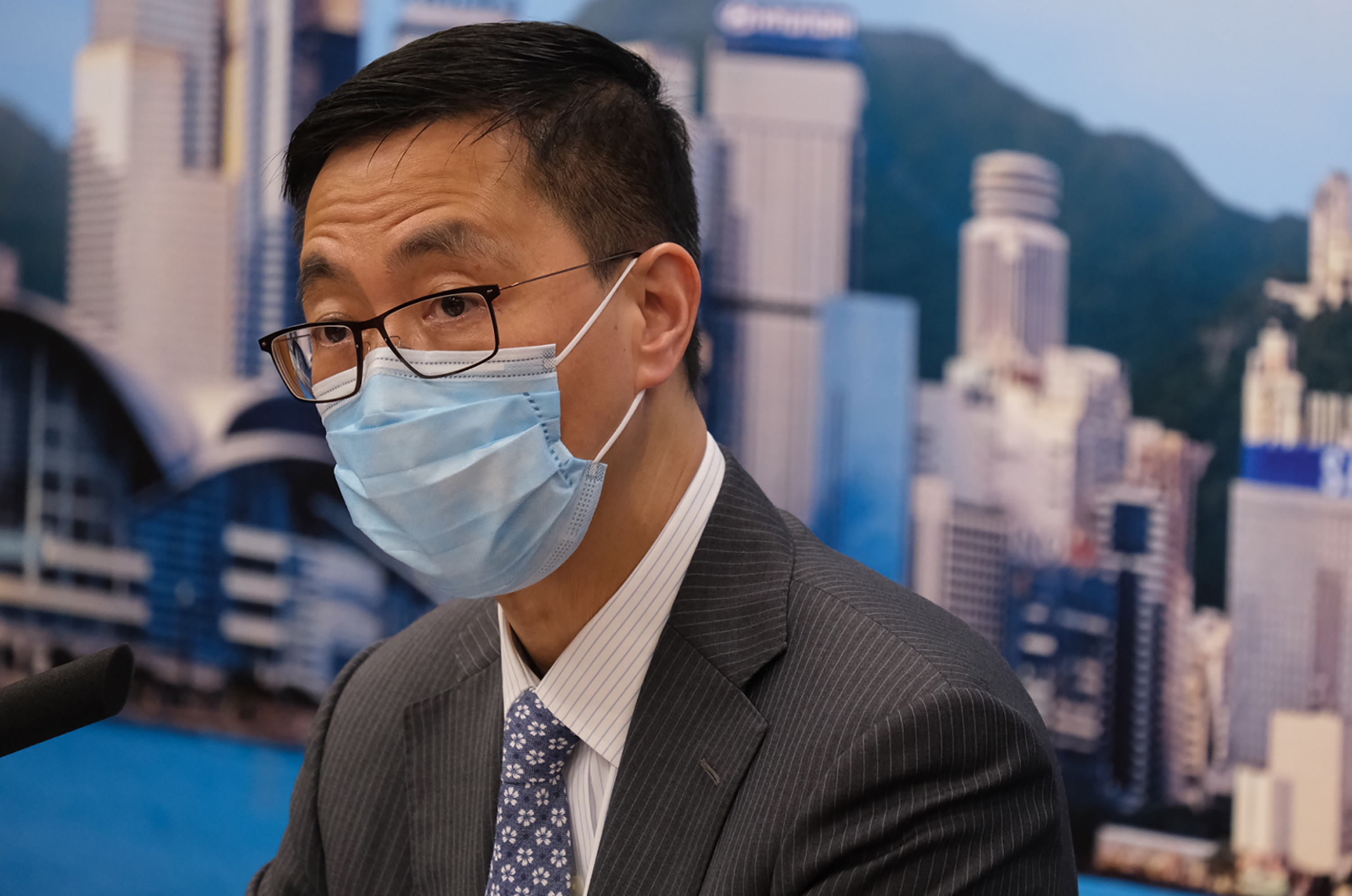
Kevin Yeung, secretary of education of Hong Kong Special Administrative Region (HKSAR) government, attends a press conference in Hong Kong, south China, May 15, 2020. (Xinhua)
Experts said the incident is just the tip of the iceberg and called on the government to channel more energy into supervising teachers’ behavior and ensure that teachers observe professional ethics.
Teachers falsifying historical facts and giving incorrect information to students have been the ongoing problems in Hong Kong.
Last month, a teacher from a Hong Kong primary school was reported for deliberately lecturing a class that the Opium War, a war of aggression by Britain against China in 1840, was started as a British attempt to ban opium smoking in China.
Gu Minkang, former deputy dean of the law school of City University of Hong Kong, said a major problem is that some educators in Hong Kong fail to maintain objectivity and neutrality in their teaching work.
Although it has been nearly 23 years since China resumed sovereignty over Hong Kong, national education has long been absent. Chinese history had not been treated as an independent compulsory subject for about two decades. In addition, the so-called “liberal studies” which were initially designed to encourage students’ critical thinking and have been widely promoted, have descended into courses rampant with biased and selective materials, leading students into forming a negative view of the Chinese mainland.
In a textbook for junior high school, the Nanjing Massacre is only described in 75 Chinese characters, but the Great Leap Forward and the Cultural Revolution are introduced in detail in over 18 pages, columnist Chris Wat Wing-yin said.
“It is easy to understand why some young people in Hong Kong do not blush when holding up British and American flags in protests,” Wat said.
“Liberal studies should encourage critical thinking, yet some go to extremes and lose their judgment of values,” Chan Cheuk-hay, the principal of Hong Kong College of Technology said. “We are seeing a lot of youngsters lacking the sense of right and wrong and losing their basic moral principles.”
POLITICS ON CAMPUS
Apart from biased education, many campuses have also been infiltrated by politics in Hong Kong.
Some teaching materials have content that attacks “one country, two systems”, glorifies the 2014 illegal “Occupy Central” movement, fans conflicts between Hong Kong and the mainland, and even advocates “Hong Kong independence”.
During the social unrest in 2019, teenagers were frequently found marching in unauthorized processions, storming police lines and committing serious street violence from vandalism to setting fires.
According to police figures, among the 8,001 people who were arrested from June 2019 to mid-April this year for their involvement in the unrest, 3,286, or about 41 percent, are students.
The suspect who slashed a police officer in the neck with a knife in October last year was a high school student, and a 15-year-old was arrested recently for throwing petrol bombs at a police vehicle.
Experts attributed the phenomena largely to some schools used by ill-intentioned opposition politicians as a propaganda platform to disseminate biased information, stir up hatred and advocate radical ideas.
“Young people are being incited to disobey rules at school, home and also on the street,” said the principal of Hong Kong’s Heung To Secondary School (Tseung Kwan O) Tang Fei. He also cited absurd slogans that have poisoned many young people’s minds, such as “achieving justice by violating the law.”
Chan of Hong Kong College of Technology noted that opposition politicians exploited the immaturity of students going through a period of rebellion.
During the social unrest, some schools have been criticized for condoning teachers and students taking part in illegal and violent acts and allowing their campuses to become platforms for instigating violence and even “weapon factories”.
“For colleges and schools, a critical mission is to prevent students from being deluded,” Chan stressed. “The chaos will eventually end, but what worries me most is its influence on the younger generation, on their values and extent of tolerance for violence.” ■








